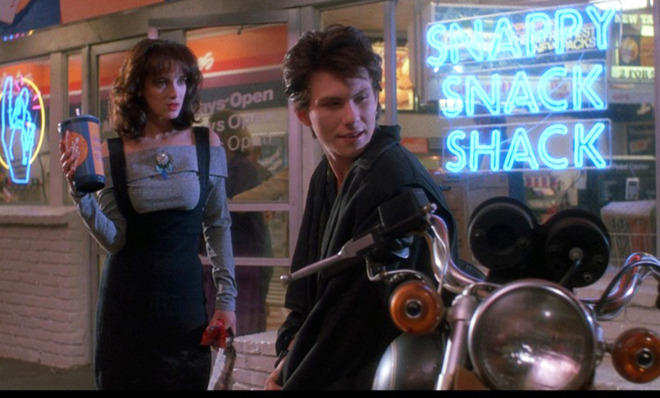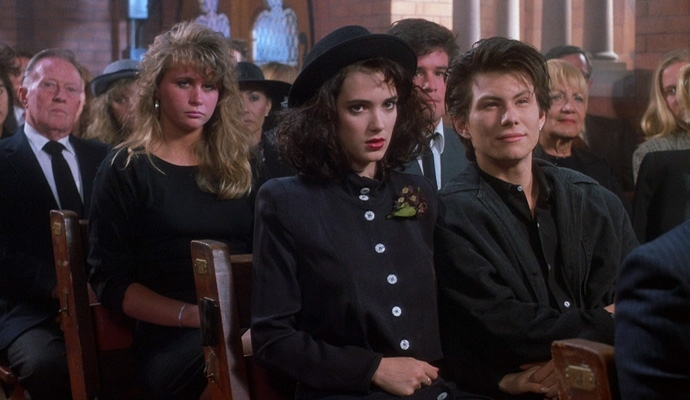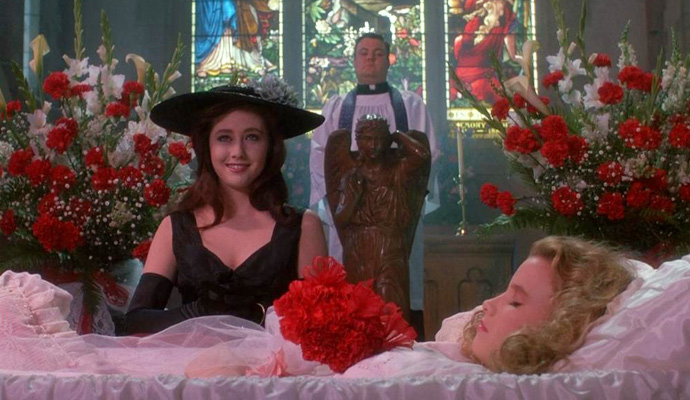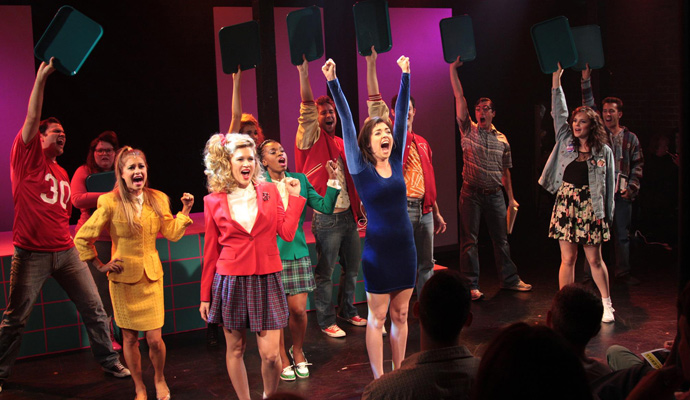Girls on Film: Why no teen film compares to Heathers
It's been 25 years since the cult classic's release, but it's still the darkest, smartest take on being a teenager


A free daily email with the biggest news stories of the day – and the best features from TheWeek.com
You are now subscribed
Your newsletter sign-up was successful
Twenty-five years ago, Heathers hit movie theaters — and totally flopped.
Blame New World Pictures, which failed to find its audience in theaters. When Heathers hit video stores, it became an instant cult classic, as the pitch-black satirical story of Veronica (Winona Ryder) and J.D. (Christian Slater) offered the lone dark pocket in a sea of saccharine teen fare.
In the early '90s, the VHS era was pivotal for teens like me (if only because we could escape being carded for R-rated movies). My parents had no idea of the profane glory on the Heathers tape when they drove me to the video store to pick up a movie I could watch with my friend. Superficially, it looked like any other teen movie — and thankfully, no one at the store felt obliged to point out its R rating. I'll never forget watching it, instantly mesmerized by a deluge of color, profanity, strength, and angst.
The Week
Escape your echo chamber. Get the facts behind the news, plus analysis from multiple perspectives.

Sign up for The Week's Free Newsletters
From our morning news briefing to a weekly Good News Newsletter, get the best of The Week delivered directly to your inbox.
From our morning news briefing to a weekly Good News Newsletter, get the best of The Week delivered directly to your inbox.
Heathers was a revolutionary experience because it didn’t follow the narrow confines the ratings system had imposed on teen narratives in the name of morality. It was real and raw, even in its candy-colored satiric absurdity. Heathers was a scathing response to the "very special" issue episodes of the '80s. All of the same teen laments were present — eating disorders, date rape, bullying, gossip, suicide, drinking, cliques — but without the melodrama that demanded that teenage darkness be matched with an obvious moral message. (The message was still there, but the film knew its audience didn't need to be spoon-fed.)

Heathers isn't so much a film as it is a satirical, carefully written play immortalized on celluloid. There are distinct cues that every player must hit, and dialogue that works like the manic love-child of Ernest Hemingway and Amy Sherman-Palladino: Crisp, brief, and charmingly rapid-fire. If Shakespeare wrote in iambic pentameter, Daniel Waters wrote Heathers in neologic stichomythia — a new, lyrical language that thrives on the invention of new tongues spoken in quick, banteringly brief lines.
The result is a sort of spoken-word opera, one that is just as engaging as the unique visuals on-screen. As a teen, I immediately rewound and watched the film again once it was over. I watched Heathers like I would listen to music. When I learned to drive, I recorded the film on audiotape, and reciting the lines became my new form of car singing. I learned the film from beginning to end, and even years later, the lines pour out like that old song you haven't heard in years but never forget.
The language engages the audience, and it also reveals the level of performance each character partakes in. The more defined and powerful — whether they be popular kids or adults with authority — are more stichomythic. The less defined and desperate speak more organically and relatably, the lack of affectation being a sign of weakness. Veronica's parents are hands-off, affluent, clueless people, but she just briefly shakes mom out of this role, as the usual lingo about prom contenders gives way to a genuine and heartfelt rant about children complaining about being treated like human beings. An instant later, she's back in denial mode and asks: "Want some pate?" Likewise, the geeks of Westerburg High speak with general affection and sincerity, and when they don't, they're mocked; it's a performance no one buys. When The Geek challenges Kurt and Ram with "sit and spin," he's bullied into submission; when Martha Dunstock "belly-flopped in front of a car wearing a suicide note" to be cool, her classmates mock her.
A free daily email with the biggest news stories of the day – and the best features from TheWeek.com
Waters makes it explicitly clear that each persona is a performance. Heather Chandler is Queen Bee, but she continually works to keep that role. Her job is to diffuse every challenge to her authority. She knocks Heather Duke’s green croquet ball out of the field when green steals the spotlight. She vows to destroy Veronica because she knows she can’t control her, and Veronica’s "affection for regurgitation" is just the gift Heather needs to do it. When she is killed, Heather Duke takes on the red persona of action, leaving her green observer behind to wear the red scrunchy and lead the school.

Power at Westerburg High is fleeting, and the popular girls weren't always on a higher social stratum. In the film's first scenes, Waters reveals that Veronica used to be friends with Betty Finn, until she became popular and joined the Heathers. But lest we think that this is an anomaly, J.D. later reveals that Heather Duke used to be close with Martha.
It is hard to see J.D. and Veronica as villains, not only because of their charismatic chemistry (and Ryder's ability to "work the quirk without letting the quirk work her") — but also because the real, darkest villain is high school myth-making. For instance, the mean Heather Chandler is retroactively immortalized as a sweet, lost soul by the frenemies who praise her to get attention on TV. J.D. and Veronica's fake suicide note recasts Heather as a creative type who will be falsely memorialized in a yearbook spread with poems and artwork. Everything — from popularity to memorials — is a lie.
Heathers understands that teenage emotion is fodder for the media. The flaky Miss Pauline Fleming prides herself on wanting to hear her students' feelings, but it's only so she can capture the television spotlight with "one mighty circuit" of "togetherness." Everyone clasps hands, and everyone knows it is a lie. The students play along, and then go home to listen to "Hot Probs," a radio show where students call in to reveal their darkest secrets, which their classmates mock the next day. The show is a nod to Jim Trenton's radio show Loveline (he even plays the Hot Probs DJ), and cleverly speaks to the early voyeurism that would eventually become reality programming, which has gradually morphed into a mass of hot problems social media snarks at.
Being so in touch with the base elements of adolescence, it's no surprise that Heathers has persevered for 25 years, and has been the topic of remake, sequel, and musical chatter. Producer Jenny Bicks tried repeatedly to get a revamp off the ground, one that would see Veronica return to Sherwood and subject her daughter to the cliquish offspring of her old friends. Winona Ryder herself even tried to get a sequel off the ground by claiming that there was already one in the works. The only reboots that have found footing are Heathers: The Musical, which is performing off-Broadway, and the rare, spiritual brethren like Mean Girls.

Unfortunately, no Heathers reincarnation has come close to replicating the original. Mean Girls dove into girl cliques and bitchery, but through an utterly sweet and earnest protagonist (Lindsay Lohan's Cady). Now the musical has rewritten the narrative, making Veronica an innocent virgin unabashedly in love with J.D., and made Martha "optimistic even in the face of rejection" as she sings about a kindergarten boyfriend.
The addition of earnestness and sweetness, of songs and makeovers, makes each predecessor into the sanitized product that screenwriter Daniel Waters once knocked. Heathers is meant to be cold, dark, and unforgiving. It's not a romance; it's a war movie. Its anti-heroes literally light cigarettes in the ashes of each other's bodies. People die — and if Waters had his way, everyone would have. Before the studio nixed the idea, Waters planned for the school to blow up, and the students to celebrate their prom in heaven.
Instead, J.D. sacrifices himself for his cause — but his moment of earnestness is also a kind of self-indulgent ridiculousness. Underneath his own Jack Nicholson-esque persona is a whiny boy who feels unloved. Nevertheless, he has a moment of redemption, and issues a challenge to Veronica: "Now that you're dead, what are you gonna do with your life?"
Veronica lays down a new law as she rips the red scrunchy from Heather Duke's head and states, "Heather, my love, there's a new sheriff in town." The soot-covered Veronica walks right over to the equally beaten Martha Dunstock and asks if she would like to spend prom night renting some new releases and popping some popcorn. "I'd like that," Martha replies with an unimaginably soft voice, a gentleness so unexpected that it makes her society-imposed silence all the more cruel. (It's an important revelation that loses its power when the girl gets solos in the musical.)
Even then, this is not so much a "happy ending" as it is a dare from its heroine to challenge social structures and follow your own path. Veronica's "teen angst bullshit has a body count," and it takes more than one move against one power-hungry girl to change the town of Sherwood, Ohio, where a bottle of mineral water is seen as an infallible sign of homosexuality.
Heathers offers one battle in a much larger war, and unfortunately, it's one that no one has had the courage to take on with the same force — and with the same wickedly delicious sarcasm. In the words of J.D., "Moby Dick is dunked. The white whale drank some bad plankton and splashed through a coffee table, and now it’s your turn to take the helm."
Girls on Film is a weekly column focusing on women and cinema. It can be found at TheWeek.com every Friday morning. And be sure to follow the Girls on Film Twitter feed for additional femme-con.
Monika Bartyzel is a freelance writer and creator of Girls on Film, a weekly look at femme-centric film news and concerns, now appearing at TheWeek.com. Her work has been published on sites including The Atlantic, Movies.com, Moviefone, Collider, and the now-defunct Cinematical, where she was a lead writer and assignment editor.
-
 Democrats push for ICE accountability
Democrats push for ICE accountabilityFeature U.S. citizens shot and violently detained by immigration agents testify at Capitol Hill hearing
-
 The price of sporting glory
The price of sporting gloryFeature The Milan-Cortina Winter Olympics kicked off this week. Will Italy regret playing host?
-
 Fulton County: A dress rehearsal for election theft?
Fulton County: A dress rehearsal for election theft?Feature Director of National Intelligence Tulsi Gabbard is Trump's de facto ‘voter fraud’ czar
